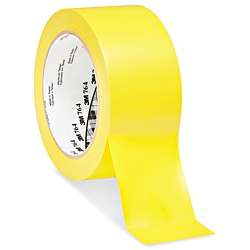Economy Tapes

Economical tapes 3M 764, 3M 766, 3M 767. Self-adhesive floor marking tapes, specially designed for floor marking and warning marking in production and warehousing premises.
This tape is widely used for marking the direction of movement of transport and workers, marking of storage areas, labeling of hazardous production areas, separation of spatial zones, marking of columns, marking of fire barriers, marking of sports grounds, etc.
Tapes are an excellent alternative to other markings methods and marking with paint because it has some advantages: non-toxic, meets international environmental conditions, is not flammable, resistant to chemicals, wear-resistant, etc.
Possibilities
| Marking of floors of warehouses With the help of contrasting tape, zoning places of goods storage, pallet layout are carried out. Signal tapes 3M yellow and 3M yellow-black are the most popular for marking floors, indicating the direction of movement of forklifts. |
 |
| Marking of sports grounds Due to the high wear resistance and different color choices, the 3M marking tapes can be used for marking sports grounds and halls. |
 |
| Color Coding You can use 3M tape for color coding of pipelines and other objects: a wide range of colors and tapes sizes provides unlimited possibilities for choosing the marking options. |
  |
| Signal designation of potentially dangerous places, for example, stairs, ramps For safety and for the greatest color perception, the beginning and end of the potentially dangerous zone should be highlighted with a signal color. To do this, we recommend using the marking tape 3M yellow or 3M 5702. |
 |
| Marking of locations of means of fire protection To attract attention and quickly find means of fire protection in case of fires and smoke. Recommended for the use of Scotch 3M red |
 |
Applications
The signal marking is intended to attract people’s attention to immediate or possible danger, working units of equipment, machines, mechanisms and structural elements that may be sources of hazardous or harmful factors, fire equipment, fire and other protection equipment, safety signs and signal markings.
| Signal color | The meaning of the marking | Scope of the marking |
|---|---|---|
 |
Immediate danger Emergency or dangerous situation Fire-fighting equipment, means of fire protection, their elements |
Prohibition of dangerous behavior or actions Indication of immediate danger Alarm message about emergency shutdown or emergency condition of equipment (process) Designation and location of fire equipment, fire protection means, their elements |
 |
Possible danger | Identification of possible danger, dangerous situation Warning, warning of possible danger |
 |
Safety, safe conditions Help, rescue |
Report on the normal operation of the equipment, the normal state of the process Identification of evacuation routes, first-aid kits, cabinets, first aid facilities |
 |
Prescription to avoid danger Specifying |
Requirement of mandatory actions to ensure safety Allowing certain actions |
The marking with contrasting colors is intended to enhance visual perception and highlight on the surrounding background safety signs, signal markings and explanatory inscriptions.
| Signal color | The meaning of the marking | Scope of the marking |
|---|---|---|
 |
Attraction of the greatest attention to the zone of possible danger | Identification of possible danger, dangerous situation Warning, warning of possible danger |
Recommendations for the application of tapes for marking
To determine the possibility of using tapes, it is necessary to test their operation on a barely visible area of the surface.
The tape should be applied after preliminary surface preparation. The optimum adhesion strength is achieved at a temperature of +16 to +27 ° C.
When applying long straight lines of marking (except curves with sharp bends) it is recommended to use an applicator for marking the floor. To produce curved lines, the tape should be applied slowly on the outside of the reference line (Pic 1).
When applying curved lines, first glue the inside of the tape along the reference line, then gently flatten the tape across its entire width ( Pic 2). Do not rush when applying tape to prevent it from peeling off and excessive stretching.
To ensure the best possible contact between the adhesive and the surface, use a roller or squeegee when applying the tape.
When overlapping the tape, for example, when making corners or joining different sections of the tape, the overlap length must be at least 5 cm or the entire width of the tape ( Pic 3). When joining butt-ends, both ends of the tape should be pressed as much as possible to the surface in order to avoid their peeling off ( Pic 4).
In places where the movement crosses the marking line, either fix the edge of the tape (Pic 5) or cut the tape every 10-15 cm to avoid detaching the long sections of the tape. In case of damage to the markup line in this case, you will need to replace only a small area ( Pic 6).
Technical data sheets:
Video
Showing all 4 results
Showing all 4 results









